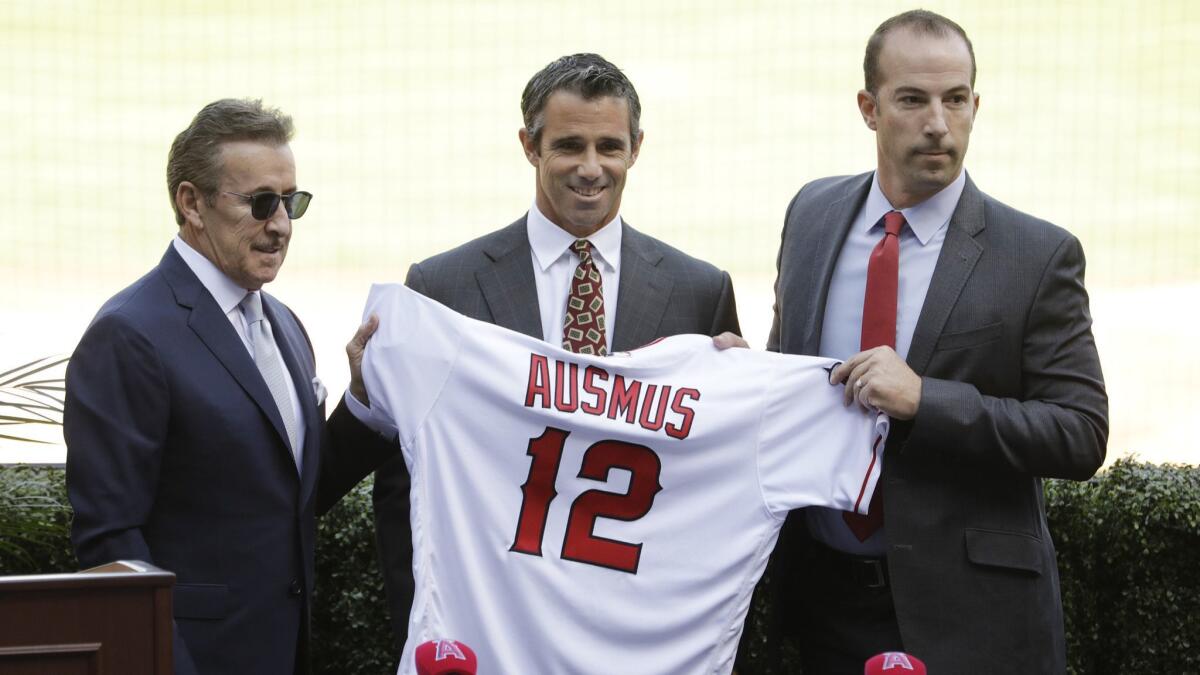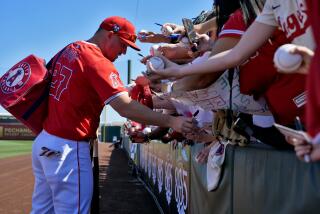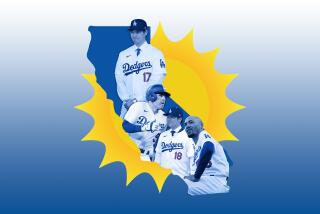Column: Angels get the answers they want from manager Brad Ausmus, but the probability of winning remains unanswered

Candidates for the job as manager of the Angels were asked to take a long, detailed written exam to demonstrate their knowledge and ability to reason. Oddly, the test posed no questions about players on the team’s roster or in the farm system.
“There’s plenty of time to learn those things,” general manager Billy Eppler said. “We needed to get a sense of how they think, how they problem-solve.”
The questions were situation and probability based. One asked the candidates to state the probability of three consecutive strikeouts, in the context of the league average. The correct answer, according to Eppler, is 1%.
Which leads to the most important question of all: What is the probability the Angels will win the World Series anytime soon?
“I can’t answer that question yet,” Eppler said with a smile Monday after a news conference that introduced former major league catcher Brad Ausmus as the successor to longtime manager Mike Scioscia.
Ausmus, a Del Mar resident, joked that he hadn’t gotten his test results but thought he had stated 2½% as the answer to that question. Close enough. And Eppler did say creative thinking was awarded extra credit.
“I do want to make one thing clear,” Eppler said. “We weren’t so interested in what the answer was. We were more interested in how you arrived at the answer you wrote down. So that’s what we spent most of our time talking about, the how and the why. Not so much the, ‘What is the answer?’ ”
Ausmus, 49, did well enough with those hows and whys to emerge from a preliminary field of 10 and final field of three to get a three-year contract. It’s unclear whether he was the highest-scoring choice but he certainly was the closest at hand after spending last season as an assistant to Eppler.
After an 18-year catching career that ended with two seasons with the Dodgers — then-manager Joe Torre allowed him to manage the final games of 2009 and 2010 — Ausmus spent a few years in the San Diego Padres front office before becoming manager of the Detroit Tigers. He compiled a 314-332 record and earned no postseason wins in one playoff appearance in his first season, in 2014. Toward the end of his tenure, the Tigers began a complete rebuild and traded many top players. He wouldn’t be the first manager or coach to follow a first-time failure with a second-time success.
“There’s no question that experience is an asset,” he said. “I think in any walk of life, experience is an asset.”
While working with Eppler he became involved in all phases of the Angels operations, including scouting and development. He has wholeheartedly embraced analytics — unlike the old-school Scioscia — and Eppler has embraced him.
“Throughout the year I just learned what kind of person he was and how he connected with people, a little bit about his demeanor, and then also I really got to gauge his intellectual curiosity,” Eppler said of Ausmus.
The year also helped Ausmus develop his skills.
“I had to adapt,” he said, “and part of the reason I was looking forward to joining Billy on the staff is because I wanted to find out more about how we can help players on the field to be better, how we can help teams win.”
And that, he said, is his goal.
“We’re here to win baseball games. We want a championship,” he said. “I spent 18 years as a player, four years as a manager, and I do not have a World Series ring. I want a World Series ring. That’s very important to me.”
Ausmus, who said he hopes to pick his coaching staff within a few weeks and wouldn’t say whether anyone from Scioscia’s staff will return, doesn’t plan to overload players with analytics.
“In the end, baseball is played by human beings and you can’t ever forget that,” he said. “Players do not want a bunch of numbers. They want little bits of information that are going to make them better or help the team win. So part of the job of the coaching staff and the manager are, take that data and put it in baseball language. Put it in lingo that is easy for them to digest and easy for them to translate so they can put it into play on the field.”
He takes over a team that hasn’t made the playoffs since 2014, urgently needs pitching help, and faces delicate questions regarding aging Albert Pujols and two-way standout Shohei Ohtani. Ausmus said he knows Pujols well and respects him, but won’t make any plans until spring training, when he can gauge Pujols’ recovery from knee surgery. Ohtani continues to progress in his recovery from elbow ligament-replacement surgery but won’t pitch again until 2020.
“I think the expectation is hopefully sometime the first third of the year he’s DHing again,” Ausmus said. “We have to be cautious.”
Ausmus acknowledged his debt to Scioscia, whom he has known for 25 years. The two sat in Scioscia’s office and talked baseball often last season and Ausmus said Scioscia texted him Sunday to wish him good luck.
“It’s never going to ever be easy to replace somebody like Scioscia. I replaced a guy named Jim Leyland in Detroit, another Hall of Fame-type manager and that’s the nature of the game,” Ausmus said. “Sosh was here for 19 years. I don’t know that we’ll ever see that again. But I’m not here to try and be Mike Scioscia. I think he was a great, great manager. Maybe he continues to manage. But I’m not here to be Mike Scioscia.”
He’s here to be Brad Ausmus, whatever that might prove to be. One point he made is that his Angels will run out ground balls and hustle on every play.
“At the end of the day,” he said, “I hope the people that are across the field from us and people that sit in the stands, Angels fans, watch us and say, ‘You know what, they play the game the right way.’ ”
It’s on him now to turn that probability into reality.
More to Read
Go beyond the scoreboard
Get the latest on L.A.'s teams in the daily Sports Report newsletter.
You may occasionally receive promotional content from the Los Angeles Times.






